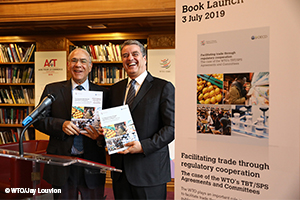Direction de la Gouvernance publique

Facilitating Trade through Regulatory Cooperation
The Case of the WTO's TBT/SPS Agreements and Committees
The WTO plays an important role in supporting efforts to achieve international regulatory
cooperation (IRC) and to facilitate trade. First, the WTO provides a multilateral
framework for trade among its 164 members, with a view to ensuring that trade flows
as smoothly, predictably and freely as possible. Second, the WTO’s Agreements provide
important legal disciplines, helping to promote good regulatory practice and IRC at
the domestic level as a means of reducing unnecessary barriers to trade.
This publication highlights how the WTO’s Agreements on Technical Barriers to Trade
(TBT) and on the Application of Sanitary and Phytosanitary Measures (SPS) and the
work of their related Committees promote opportunities for regulatory cooperation
among governments and ease trade frictions. It demonstrates how members’ notification
of draft measures, harmonisation of measures with international standards, discussion
of specific trade concerns and other practices help to facilitate global trade in
goods. The study also makes recommendations on how to benefit further from the transparency
and cooperation opportunities provided by the TBT and SPS Agreements.
Published on July 03, 2019
